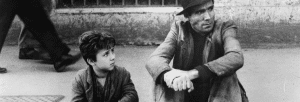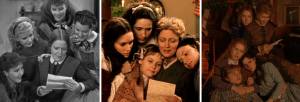Film is about telling the specific and unique stories of characters and, at its best, encourages the audience to discern how much of themselves they see in the individuals on screen. As such, films that tackle the challenges and blessings of family life can be particularly efficacious for us in whatever familial situation we belong to.
Among many things, these films encourage us to grow deeper in appreciation for the joys we’ve experienced in our own families or assist us in reflecting on the trials we’ve faced or are currently facing. They can also serve as catalysts for positive change and growth within ourselves, should we happen to see our own lapses and shortcomings highlighted in a character.
Film can be an incredibly powerful impetus for growing in personal holiness and better fulfilling the familial role we hold. Fortunately for us, there are many great films that effectively portray the very real challenges and joys of the family and presented here for your discernment is a small selection of those films.

LADRI DI BICICLETTE (Bicycle Thieves) (1948)
Starring Lamberto Maggiorani, Enzo Staiola, Lianella Carell
Directed by Vittorio De Sica
Often hailed as one of the greatest films ever made, “Bicycle Thieves” chronicles the plight of a poor Italian family as they frantically search for the father’s stolen bicycle, which is required for his new and desperately needed job. The film is overwhelming in its depiction of social inequities and post-World War II alienation, but the real heart of this tragic tale can be found in the relationship between father and son, Antonio and Bruno. The young Bruno serves as the whetstone for Antonio’s shortcomings and hopelessness as the situation grows more desperate and he embodies the reality that in a cruel and callous world, the family remains the great conduit of hope and compassion.
**Italian with English subtitles
Recommended ages: Teens and up

COCO (2017)
Starring Anthony Gonzalez, Gael García Bernal, Benjamin Bratt
Directed by Lee Unkrich
While the depiction of the afterlife presented here is not one that adheres to Catholic teaching (or claims to, for that matter), the film does explore the importance of generational relationships and of honoring your ancestors in the spirit of Catholic teaching on these issues. “Coco” does all of this in a very palpable and visually engaging way and throughout the story, perhaps inadvertently, it does echo a variety of Catholic eschatological concepts including the communion of saints, the effects of sin generationally and the dignity of the dead. But at its core, the film remains a story about the importance of maintaining connections with elderly family members and keeping the memory of the deceased alive. Visually stunning and thematically bolstered by the wonderful ballad “Remember Me,” “Coco” is a feast for the eyes and ears and a serviceable catalyst for deeper discussions on Catholic family and afterlife teachings.
Recommended ages: Kids and up

LITTLE WOMEN (1933, 1994, 2019)
Starring Katharine Hepburn (1933); Winona Ryder (1994); Saoirse Ronan (2019)
Directed by George Cukor; Gillian Armstrong; Greta Gerwig
While there is no shortage of cinematic adaptations of Louisa May Alcott’s 1868 classic, these three emerge as best in capturing the spirit of the novel and each offers a uniquely tinted lens into the world of the March sisters. See Cukor’s 1933 film for an enchanting and triumphant adaption made for an audience suffering through the Great Depression; Armstrong’s 1994 version is imbued with tenderness and faithfulness to the Alcott’s vignette-style; and Gerwig’s edition, the most recent entry, is wild and passionate, rearranging the structure of the story to give familiar emotional beats greater depth and impact. What remains in sharp focus throughout all three movies is the palpable love and affection between the March family as they cross from childhood to adulthood and navigate tumultuous periods in their lives.
Recommended ages: Kids and up

QUEEN OF KATWE (2016)
Starring David Oyelowo, Lupita Nyong’o, Madina Nalwanga
Directed by Mira Nair
“Queen of Katwe” is based on the true story of Phiona Mutesi, a young girl from a slum in rural Uganda who, through the guidance and mentorship of a young missionary portrayed by David Oyelowo, finds herself to be a prodigy chess player. But the road from the impoverished community of Katwe to the world of competitive chess success is fraught with challenges, even from within her own family. Phiona’s loving mother, in a heartbreaking performance from Lupita Nyong’o, is fiercely determined to protect her family from the overwhelming circumstances of their environment and to not allow them to be crushed by disappointment as she herself has so often been. But, in life as in chess, “the small one can become the big one” and Phiona’s confidence and determination, bolstered by her loved ones, mentors and neighbors, not only change her world but the world of her family and her community.
Recommended ages: Kids and up

TOKYO MONOGATARI (Tokyo Story) (1953)
Starring Setsuko Hara, Chishū Ryū, Chieko Higashiyama
Directed by Yasujirō Ozu
Considered director Yasujirō Ozu’s masterpiece, “Tokyo Story” follows the visit of an elderly couple to Tokyo to spend time with their children and grandchildren. Despite having not seen their parents in a while and never seeing them often, the adult children quickly become burdened by the visit and the interruptions it causes to their busy lives. Setsuko Hara’s Noriko, the widowed daughter-in-law of the couple, is the film’s great glimmer of hope: her kindness and generosity toward the aging couple mirror the
story of Ruth and Naomi and reinforce the idea that devotion to family extends beyond blood relatives.
The film is devastatingly poignant in its depiction of the generational conflict between aging parents and their grown children, and its reflection of the post-World War II breakdown of the family still resounds nearly 70 years later.
**Japanese with English subtitles
Recommended ages: Teens and up
